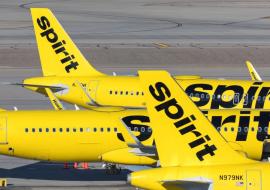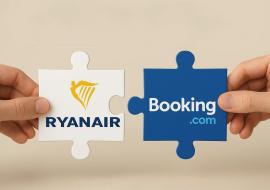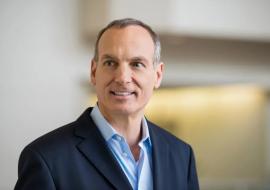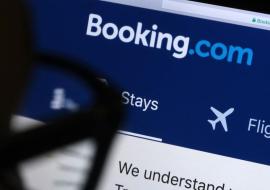New LIAT CEO Making Right Noises while CAL’s Counterpart Maintains Strict Silence
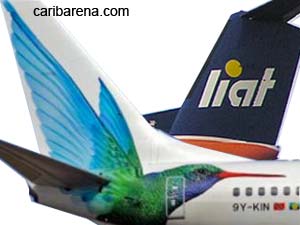
Whether new LIAT boss can lead the cash-strapped Caribbean carrier out of the financial woods in which it has lived for decades is a work in progress, but to his credit, he is certainly making all the correct noises.
Within a week of his landing in Antigua, LIAT’s home base, he took issue with the high taxes passengers are forced to pay to get around the Caribbean. As David Evans sees it intra-island customers should be given a “fairer deal” by reducing the onerous tax regimes which now exist and he has called on the various governments to revisit their tax policies.
He admits that taxes are important to re-invest in aviation infrastructure. He also agreed that the Caribbean tax burden was not significantly high compared with other parts of the world, but suggested during regional broadcast organized by the Caribbean Tourism Organization (CTO) that a lighter taxation regime would stimulate greater demand and an increase in the “tax take” back to the government.
Evans, is no stranger to the Caribbean and its cultural mores, since he served as Area Manager for British Airways (BA), and is regarded as an aviation expert, held no qualms in announcing he was prepared to listen to the shareholders his staff and of course his customers, whom he says, “definitely know the airline business much better than I do”.
He also said he would focus on what we do well and what we can do better and indicated he would put in place a few small wins to improve performance while laying down plans for the longer term, one of those being positioning LIAT as “the airline of the Caribbean and for the Caribbean”.
Addressing a problem which has haunted LIAT like forever – effective customer service – a press report out of St John’s stated Evans understood that taking care of customers was the basis of success and stated the airline’s service would be a key differentiator, because “it is people who deliver service not airplanes and engines”.
In a bulletin titled “Letter from the CEO”, Evans disclosed the airline was undertaking a wide-ranging review of all its commercial activities with the sole aim being the enhancement of its revenue earning potential.
“A small team of airline commercial experts, who are not professional consultants but rather people with real life airline experience, will be spending the next few weeks at LIAT’s Headquarters in Antigua and across the network to put in place very specific enhancements to the commercial processes.”
He said because of this exercise, he expected to see some “real improvements in our revenue performance in a relatively short period of time”. He has also pledged to tackle the ticklish problem of flight disruptions by making the present complex schedule simpler and pay greater attention to service delivery.
Delivering a corporate tid-bit, on the CTO program, Evans said, “LIAT is worth – outside its airline activity – well over (US)$100 million annually to the region in terms of the jobs it creates and the impact it has on tourism.”
On the issue of capacity, he gave the assurance that meeting any increased demand for seats was not a major hurdle and said, “Any airline faced with increasing demand will be happy with that situation and it would find a way, either in its own right or in some sort of co-operative fashion to provide that extra supply or capacity.”
In an indirect message to other Caribbean carriers, the major of which is Trinidad and Tobago-owned Caribbean Airlines Limited (CAL), Evans said he saw a real opportunity for collaboration among regional carriers. ‘While competition is absolutely essential, there is more we can do in co-operation with each other than we are doing at the moment,” he added.
Meanwhile back at Iere House at Piarco, Headquarters of Caribbean Airlines, the veil of silence remains rigidly ensconced, with the information flow stanched by political and/or board bureaucracy. The airline named its brand new Chief Executive, Canadian Michael DiLollo mere days after a Business Day story highlighted the continued delay of the announcement.
As if to make up for the delay, DiLollo appeared at a media conference less than 48 hours after he had taken up the position and was obviously hard-pressed to answer many of the questions thrown at him by reporters.
He did say however that a route analysis was being undertaken, an exercise announced months ago when the new Phillip Marshall board was named. “Caribbean Airlines has already started a route analysis process to identify what is working, what isn’t working, where are the opportunities and most of all, how can we leverage the gauge of aircraft that we have,” said DiLollo.
Talking about the JetBlue challenge of two of current CAL’s destinations – New York JFK and Fort Lauderdale – DiLollo admitted that CAL’s revenue might have dropped on those two routes because of the competition. He said, “As you would expect, whenever there is additional capacity that is put into a market by a very well capitalized company that has the assets and structure, typically they use pricing tactics and that ultimately drives revenue to the lower side.
Whenever capacity is added, it drives revenue down.” He added, “Not only are they well-capitalized, they are also extremely well-structured and efficient and their operating costs are nothing to sneeze at. It’s very competitive.”
Touching on issues that continue to dog CAL and even BWIA before that, is internal costs, which he said, “could be reconsidered”. DiLollo said, “There are much bigger costs drivers inside an airline that are more related to how things are managed and how efficiently they are done that could render us more competitive in a very short period of time.”
According to Piarco sources, DiLollo spent some time in Kingston last week in a series of meetings to get a better feel of the Jamaica end of the business and on the weekend visited Tobago to better understand operations on the sister isle.
Source: Trinidad & Tobago Newsday







